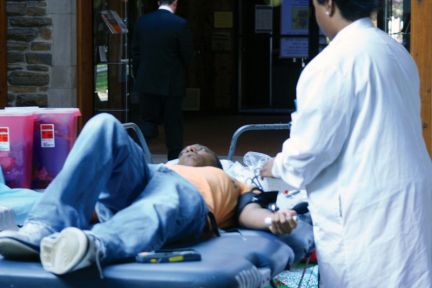Cabrini will be hosting a blood drive on Monday, April 2. The event will be held in Grace Hall Atrium from 10 a.m. to 4 p.m.
“The average blood donor can save up to three lives alone,” Joanne Mattioni, secretary for Cabrini’s Health Services, said. “That is what some people do not know but it is really important.”
Mattioni is in charge of registration for the blood drive.
Did you know that just one blood donation can save the lives of up to three people? Did you know the only way to get blood is from a human donor? Did you know how constant the need for blood is? It is a lot more than most people think.
More than 95 percent of everyone in the U.S. will need blood donated at one point in their lives. Despite this, only about five percent of people actually donate blood.
Health Services hopes that students will reach out and make the effort to give blood. The need is constant and just one donor can make such a big impact in saving lives.
“There is no way to make blood, so the only way to get it is from another person,” Mattioni said.
Mattioni also explained that there is a generic blood disorder known as sickle-cell disease. Potentially life threatening, sickle-cell disease can shorten a person’s life span.
“Sickle-cell disease is more often found within African Americans,” Mattioni said. “When most people give blood, they have the choice to donate it to a person with sickle-cell disease. We put on a label and send it to help someone within the area who has the disease. All the blood will stay within Pennsylvania. You don’t need to worry about it going to different parts of the world.”
To find out more about the blood drive, contact Cabrini’s Health Services at 610-902-8400.
To sign up for the blood drive, contact Joanne Mattioni at 610-902-8531.



